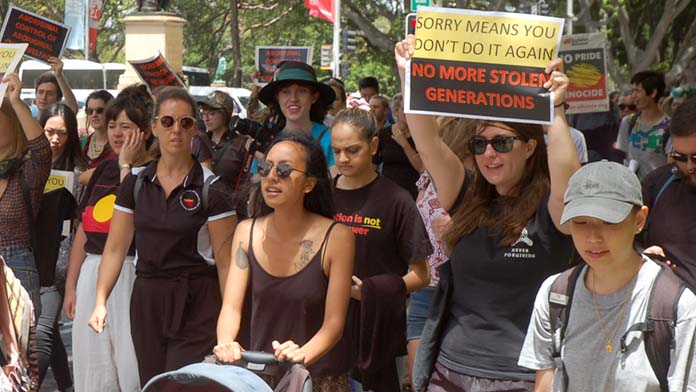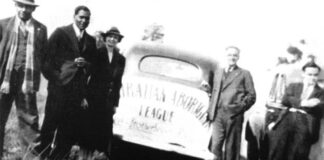The move to change the date of “Australia Day” is gaining momentum.
In the last year three Melbourne councils have voted to either not recognise Australia Day on 26 January or to move citizenship ceremonies to a different date. Hobart City Council is encouraging councillors to participate in this year’s Invasion Day march. Triple J’s Hottest 100 has shifted to the fourth weekend in January. And Greens Leader Richard Di Natale has declared changing the date a “top priority”.
But no matter what date Australia Day was held, there still would be nothing to celebrate.
The argument behind #ChangeTheDate is that it’s not sensitive or inclusive to celebrate on the date that Indigenous dispossession began—26 January, the day the “First Fleet” arrived.
But any idea of recognising Australia’s history of genocide is too much for Turnbull’s Coalition government. They have stripped Yarra and Darebin councils of their ability to hold citizenship ceremonies. They also threatened the Freemantle council, but it gave in. Not surprisingly, Labor leader Bill Shorten and Victorian Labor Premier Daniel Andrews think there is something to celebrate, and have also opposed shifting the date.
However the racism and injustices against Aboriginal people did not end with the last of the massacres or their recognition as full citizens. They are intrinsic to Australia’s foundation, and are ongoing. The recent epidemic of Indigenous youth suicides, the revelations of torture and abuse that came out of the Royal Commission into Youth Detention in the NT, the persistent and growing “gaps” in health, education and life expectancy are all evidence that Australian government policies discriminate against and oppress Aboriginal people.
The struggles of the 1970s for land rights and self-determination won important concessions from Australian governments. They showed that Aboriginal and non-Aboriginal people can fight together.
But the gains have been reversed by a new wave of assimilationist policies. The Northern Territory Intervention, begun in 2007, seized control of Aboriginal townships and community assets, and imposed white managers. Many remote communities have been closed.
“Stronger Futures”, the extended version of the NT Intervention, continues, as do the punitive, paternalistic measures like alcohol restrictions and suspension of Centrelink payments for poor school attendance.
Aboriginal people are 2 per cent of the population but make up 27 per cent of the prison population. This has doubled in the last 25 years.
Aboriginal children today are being removed from their families in larger numbers than during the years of the Stolen Generations. Billions of dollars are being spent on “out of home care”, surveillance, and prisons that could be invested in Indigenous housing, education, jobs and community controlled programs.
Yet jobs in remote communities have been scrapped and Aboriginal people forced to work for the dole under the “Community Development Program” (CDP) with half their money quarantined onto a BasicsCard.
Nothing to celebrate
Regardless of whether Australia Day celebrations shifted to another date, it would still mean celebrating a country that is continuing to dispossess the Indigenous population, and leading the world in systematic torture of refugees.
Some argue that we could focus on celebrating the diversity of Australia, and the positive moments in our history. There are certainly inspirational struggles of Aboriginal and working class people, where black and white have united to fight for justice for Aboriginal people: William Cooper’s 1938 Day of Mourning, the 1972 Black Moratorium, the momentous Gurindji strike and the Aboriginal Tent Embassy to name a few.
But that is not what Australia’s political elite celebrate. Look at Tony Abbott’s sickening defence of Australia Day, celebrating European invasion as the day “western civilisation” came to Australia.
A national day is designed to bolster the idea that we all have something in common as Australians. It is designed to obscure the class divisions between workers and the ruling class that runs society and uses racism—against Aboriginal people, and against Muslims—to try and divide us.
Australian capitalism needs racism to justify the dispossession and the ongoing poverty it inflicts on Aboriginal people. Racism against Aboriginal people, refugees and migrants is also a way of scapegoating them for problems like unemployment and cuts to services.
Changing the date, like the toothless “Indigenous voice in parliament” that conservative Aboriginal leader Noel Pearson promotes, would not change the ongoing injustices. It would only maintain the myth of a “fair go” and a harmonious Australia without racism and without class divisions.
Whatever date “Australia Day” was held on, we would still need to protest. We have to fight the ongoing racism and nationalism used to maintain oppression and inequality. We don’t need to change the date, we need to change the system. Protests against Australia Day are part of that fight.
By Lucy Honan






